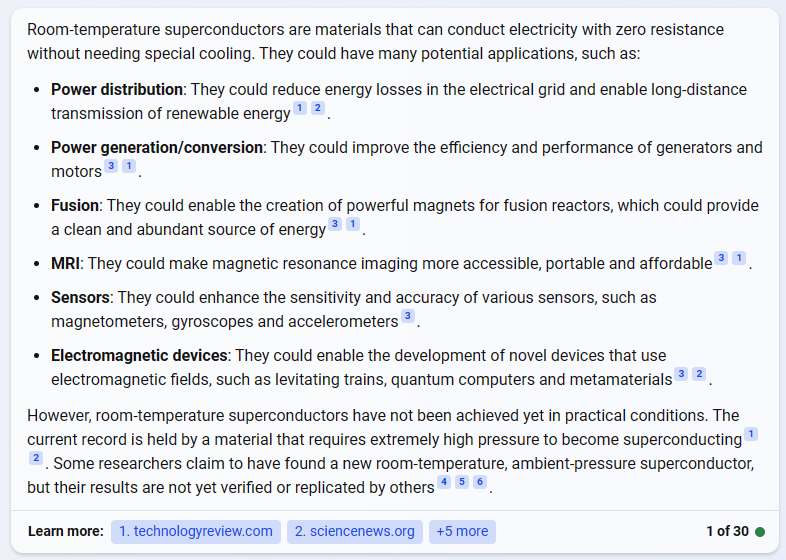2307.12008.pdf (arxiv.org)
[2307.12008] The First Room-Temperature Ambient-Pressure Superconductor (arxiv.org)
https://en.wikipedia.org/wiki/LK-99
That would be amazing. I’ll wait for the peer-reviewed publication before I pop the champagne though. Still that would be amazing. Mag-lev everything!
According to Bing, there are other benefits aside from floating trains:
Hurry up! I’m getting older and will need self driving cars in another 15-20 years when they go to take my license away (like they should have done when I was 16).
As to long distance line losses, existing materials are about 96% efficient in moving electricity hundreds of miles, regardless of the method used to generate it. The question is how much will replacing the old with the new materials increase the cost of delivered electricity above existing prices. In other words, is the squeeze worth the juice?
The most efficient way to reduce long distance line losses is to build generation very close to population centers. Unfortunately, “NIMBY” (not in my back yard) has become “BANANA” (build absolutely nothing anywhere near anything).
Wasn’t this shot down last spring?
I can tell you one area where I don’t want any superconduction. But then I’ll get suspended.
There were some interesting discussions of this on Hacker News.
Most of the usages Bing found will require quite a bit of scaling up, so don’t hold your breath, but there is one application where this could pay off almost immediately — small-scale antennas for specific wavelengths.
Why do you think Texas also leads the country in wind power generation - wouldn’t want to ruin their beautiful scenic views elsewhere…among other ambivalences…
True. Plus wind power is intermittent. Putting electricity on power lines is like scheduling trains. You gotta know when the power is needed and where to schedule a path.
Some wind farms want a guaranteed open path 24/7 just in case the wind is blowing, which is usually less than 30% of the minutes in a day. Huge cost and inefficiency the wind operators expect someone else to pay for.
It’s about physics and economics. Get the physics wrong and the lights go out. Get the economics wrong and costs skyrocket while the lights are out.
Superconducting Microprocessors? Turns Out They’re Ultra-Efficient - IEEE Spectrum
Superconducting computing - Wikipedia
Why room-temperature superconductors could revolutionize electronics (fastcompany.com)
A nice thoughtful article in Ars Technica on this issue, and on efforts to reproduce the researchers’ findings:
Thanks for posting this. Nice to see Ars doing what it does (did?) best.
Looks like this lab has somehow found the receipt of a philosopher stone (if it works), with only a fine tune balance of ingredients leading to the magical result…
This situation makes me think about the quest to verify Famous Japanese Mathematician Shinichi Mochizuki’s abc conjecture proof, on which people are still scratching their heads today 11 years after it was released…
I am constantly amazed at the collective intelligence that has been gathered on this little backwater site.
Unfortunately it may have been short-lived…
This was an interesting statement:
So basically, had they flipped the ‘superconductor’ or the levitating piece upside down, it would have snapped into contact rather than floated. Note to self: check polarity effects when using the Meissner effect (levitation) as proof.
So much for the race to the Nobel Prize.
How many times have we had announcements of cold fusion…
Race to publish has always been a thing. I suppose the web now prioritizes speed to announce. The retractions rarely get bad press. Still, feels like Brittany “did it again.”
Journal Nature retracts superconducting materials paper:
Room-Temperature Superconductor Paper Retracted by Journal Nature (msn.com)
